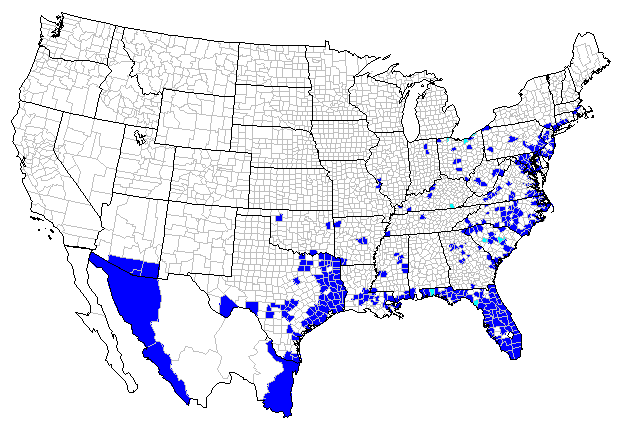 |
 

 |



Ocola Skipper (Panoquina ocola [W. H. Edwards])
Wing span: 1 3/8 - 1 11/16 inches (3.5 - 4.3 cm).
Identification: Forewings are long, projecting far beyond the hindwings when the butterfly is at rest. Upperside of wings is dark brown; forewing with some pale spots. Underside of hindwing is brown with no markings; female has a blue-purple iridescent sheen.
Life history: Flight is rapid and adults may feed while hanging upside down from flowers.
Flight: In warm summer months in the north; August-October in Arizona; throughout the year in Florida and South Texas.
Caterpillar hosts: Rice (Oryza sativa), sugarcane (Saccharum officinarum), and trompetilla grass (Hymenachne amplexicaulis).
Adult food: Nectar from flowers of lantana, shepherd's needle, swamp milkweed, buttonbush, and pickerelweed.
Habitat: Low damp fields and pastures.
Range: Resident from Paraguay north through tropical America and the West Indies to South Texas and the Deep South. Strays north to southeast Arizona, west Texas, central Missouri, Ohio, central Pennsylvania, and Long Island.
Conservation: Not usually required.
The Nature Conservancy Global Rank: G5 - Demonstrably secure globally, though it may be quite rare in parts of its range, especially at the periphery.
Management needs: None reported.
References:
Bailowitz, R. A., and J. P. Brock. 1991. Butterflies of southeastern Arizona.
Sonoran Arthropod Studies, Inc., Tucson, Arizona. 342 pages.
Opler, P. A. and G. O. Krizek. 1984. Butterflies east of the Great Plains. Johns
Hopkins University Press, Baltimore. 294 pages, 54 color plates.
Opler, P. A. and V. Malikul. 1992. A field guide to eastern butterflies. Peterson
field guide #4. Houghton-Mifflin Co., Boston. 396 pages, 48 color plates.
Scott, J. A. 1986. The butterflies of North America. Stanford University Press,
Stanford, Calif. 583 pages, 64 color plates.
Stanford, R. E. and P. A. Opler. 1993. Atlas of western USA butterflies including
adjacent parts of Canada and Mexico. Denver and Fort Collins, CO.
Author: Jane M. Struttmann

